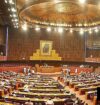U15 Canada Raises Concerns Over New Foreign Influence Legislation
Canada’s leading research universities are voicing significant concerns over a proposed foreign influence transparency registry, warning that it could inadvertently stifle international partnerships and hinder access to cutting-edge research opportunities. The U15 Group of Canadian Research Universities, representing top research institutions, is among the prominent entities urging lawmakers to reconsider aspects of the bill.
The contentious registry is a central component of an expansive anti-foreign interference bill currently being fast-tracked through a House of Commons committee. Today, the committee begins a detailed clause-by-clause review of the bill, including potential amendments, following a brief period of hearings.
The proposed legislation aims to introduce new criminal penalties for deceptive foreign interference activities, enhance information sharing with businesses, and establish a foreign influence transparency registry. This registry would mandate certain individuals to register their affiliations with foreign principals, such as states or economic entities, under threat of financial penalties or criminal charges for non-compliance.
U15 Canada, in a written submission to the committee, highlights the impracticality of the reporting requirements. Given the vast and intricate web of international research collaborations, it would be nearly impossible for large research-intensive universities to track and report every individual research partnership within the mandated 14-day period.
The organization also calls for clearer definitions regarding what constitutes an “arrangement” under the registry. There’s particular concern over whether research partnerships, funding agreements, or other academic activities with international institutions would need to be reported. The ambiguity could severely impact collaborations with global peers and hinder Canada’s participation in pioneering research.
Another significant worry is whether the dissemination of research findings through academic journals, teaching, conferences, or other public forums would be classified as a communication activity under the new law.
U15 Canada argues that such requirements could severely infringe on academic freedom and the open exchange of ideas, crucial for scientific progress.
Universities Canada, representing 96 institutions nationwide, echoes these concerns. Their submission warns that the registry might encompass communications related to political or governmental processes, including research publications on sensitive topics like foreign policy and climate change. This could lead to duplicative administrative burdens and stifle Canadian research.
Several experts advocate for a more refined model similar to the United Kingdom’s two-tier system. This approach allows for more targeted restrictions based on specific countries or entities, rather than a broad, country-agnostic registry. Benjamin Fung, a professor and Canada Research Chair at McGill University, supports this model, suggesting it would enable more precise limitations on selected foreign entities.
The Centre for International Governance Innovation (CIGI) also points out the challenges faced by Australia’s broad registry approach and suggests that Canada could learn from these experiences to develop a more effective system.
The Canadian Civil Liberties Association (CCLA) has raised alarms about the bill’s vague and broad language, which they argue could pose risks to democratic accountability. They fear the registry could be used to monitor the international activities of various actors, including media organizations, academic institutions, and charities, potentially infringing on freedom of the press and privacy rights.
The CCLA’s brief to the committee underscores the need for a balanced approach that protects national security without compromising fundamental freedoms or the international standing of Canadian research.
As the House of Commons committee reviews the bill, the feedback from universities, experts, and civil liberties groups underscores the need for careful consideration and potential revisions. Ensuring that the legislation effectively counters foreign interference without stifling academic freedom or international collaboration is crucial for maintaining Canada’s position as a leader in global research and innovation.



